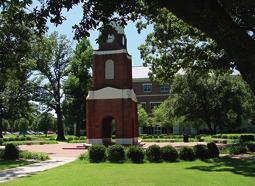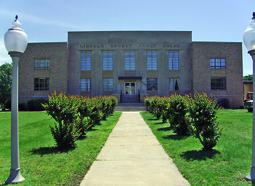

Landmarks Found Only in the Land of Legends
Cleveland County
With funding from public and private sources, much of the once-polluted Bayou Bartholomew has been cleaned up and restored to its former natural beauty.
CLEVELAND COUNTY COURTHOUSE
The Cleveland County Courthouse in Rison, Arkansas was built in 1911. It is a two-story brick structure measuring 100 feet by 70 feet, and topped by a hipped tile roof. A square central tower rises 20 feet above the roof, and includes a four-faced clock, with louvered arches below the clock, and an arched cornice above, topped by an octagonal cupola. Listed on the National Register of Historic Places in 1977, the courthouse is located at 20 Magnolia Street, Rison, AR 71665.
Grant County
OAK GROVE SCHOOL
The Oak Grove School is a historic school building in rural eastern Grant County, Arkansas. It is located on the south side of United States Route 270, about 6 miles east of Sheridan. It is a single-story wood frame structure, with a hip roof and novelty siding. It was built in 1938 with funding from the Works Progress Administration, and originally housed four classrooms. It was used as a school until 1950, and is now home to the Center Grove United Methodist Church. The building was listed on the National Register of Historic Places in 1991. The building is located at 7351 Highway 270 E, Sheridan, AR 72150
Jefferson County
THE DOLLARWAY ROAD
Drawing its name from the “fact” that the cost to build the road in 1913-14 was reputedly one dollar per running foot (actually $1.38), the road is historically significant as the longest rural concrete highway in the U.S. at the time it was built.
The smooth pavement attracted “lead-footed” drivers, which led to another roadway first. When residents along the highway were unable to persuade authorities to set a speed limit, they banded together and solved the problem by staking a 2-by-8 timber on its edge across the 9-foot-wide pavement, creating the first-ever “speed bump.” The road was listed on the National Register of Historic Places in 1974.
Lincoln County
THE HOOD BUILDING
Original home of the Merchants and Planters Bank, this is a historic commercial building at 100 Main Street in downtown Pine Bluff. It is a two-story brick building, with a hip roof and a turret at the northeast corner. The turret has stone arched openings at the base, providing access to the building entrance, and is topped by a bell-shaped roof. The building, designed by Thomas A. Harding of Little Rock and built in 1892, is a distinctive local example of Victorian Romanesque architecture. The building was listed on the National Register of Historic Places in 1978.
THE FERGUSON-BEALL HOUSE
The Ferguson-Beall House is a historic house at 902 East 4th Street in Pine Bluff, Arkansas. It is a two-story wood frame structure, with a hip roof and clapboard siding. It has a variety of projecting gable sections, dormers, and porches typical of the Queen Anne style. It was built in 1896 by local builder, Calvin Ferguson. The home remained in the family with daughter Arie and her husband, George, a cotton broker. Here is where their only child, Martha, was born. She eventually married John N. Mitchell, attorney general under Richard Nixon. Martha became a key figure in exposing the Watergate Scandal. Martha Beall Mitchell’s birthplace and childhood home was listed on the National Register of Historic Places in 1978.
LINCOLN COUNTY COURTHOUSE
The courthouse is located at 300 South Drew Street in Star City. The two-story building was designed by Wittenberg & Deloney of Little Rock and built in 1943. It is predominantly buff-colored brick, with limestone trim. The front elevation has a projecting central section that is slightly taller than the wing sections, and is faced primarily in limestone. Four triangular stepped limestone pilasters frame the elements of this section, including the main entrance in the central bay, which now has replacement doors of aluminum and glass. Believed to be the only Art Deco building in the county, The courthouse was listed on the National Register of Historic Places in 1994.
BAYOU BARTHOLOMEW
This waterway is the longest bayou in the world, meandering approximately 364 miles between Arkansas and Louisiana. It contains over 100 aquatic species making it the second most diverse stream in North America. Known for its excellent bream, catfish, and crappie fishing, portions of the bayou are considered some of the best kept secrets of Arkansas anglers. It starts northwest of the city of Pine Bluff, Arkansas, in the Hardin community, winds through parts of Jefferson, Lincoln, Desha, Drew, Chicot, and Ashley counties in Arkansas, and Morehouse Parish, Louisiana, and eventually flows into the Ouachita River after passing near Sterlington, Louisiana. The bayou serves as the primary border separating the Arkansas Delta from the Arkansas Timberlands.
JEFFERSON COUNTY COURTHOUSE
The Jefferson County Courthouse is the center of county government for Jefferson County, Arkansas. It is located in the Pine Bluff Commercial Historic District in Pine Bluff on the border between the Arkansas delta and Piney Woods. Built in 1856, the building was largely destroyed by fire in 1976. However, the surviving portions of the building were incorporated into the restored structure. The courthouse was listed on the National Register of Historic Places within the Pine Bluff Commercial Historic District submittal in 2008.
DELTA RHYTHM & BAYOUS HIGHWAY
In 2016, the Delta Rhythm & Bayous Alliance was formed to promote tourism around the Delta Blues art form. Their first successful project was to secure the legal designation of “Delta Rhythm and Bayous Highway for U.S. Highways 65 and 82 from Greenville/Leland, MS, to Pine Bluff, AR. The bill was signed into law on March 14, 2017. The Highway 65 portion starts in Pine Bluff and passes through Grady, Gould, Dumas and MGehee to Lake Village.
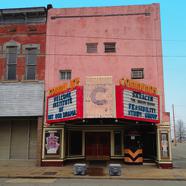
COMMUNITY THEATRE
The Community Theatre is a historic theatre building at 207 West 2nd Avenue in Pine Bluff, Arkansas. It is a two-story brick building, finished in stucco, with Moderne styling. It was built in 1889, and housed first a furniture store, and then a five and dime, before being converted for theatrical use in the 1920s. Its present Moderne styling dates to renovations made in the wake of a 1951 fire. The building was listed on the National Register of Historic Places in 2004.
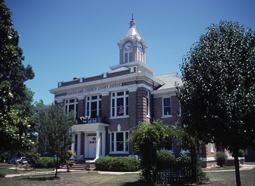
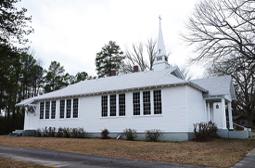
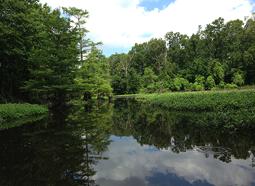


a
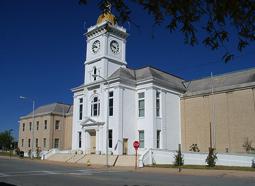
NATIONAL GUARD ARMORY
The National Guard Armory-Pine Bluff is a former National Guard armory at
623 West 2nd Avenue in Pine Bluff. It is a two-story masonry structure, built out of concrete and buff brick with Art Deco styling, included a castellated parapet. It was built in 1931, and was the first state-owned militia building in Jefferson County. It served as a state armory until 1974, housing the 39th Tank Company, and now houses vocational classrooms. The building was listed on the National Register of Historic Places in 2001.
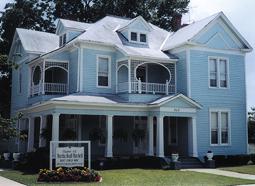
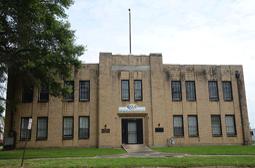
THE SAENGER THEATRE
The Saenger Theatre is an historic theater in Pine Bluff. Located at West Second Avenue and Pine Street on the southeast corner, it was added to the National Register of Historic Places in 1995. Built in 1924 to a design by Emile Weil, it is a Classical Revival brick building with an ornate interior that was last restyled in 1937. It is one of only a handful of Saenger movie palaces that remain.
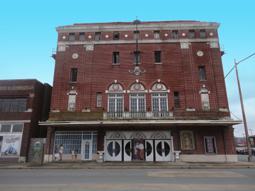
STRENGTHEN THE ARM OF LIBERTY MONUMENT
The Strengthen the Arm of Liberty Monument is a replica of the Statue of Liberty (Liberty Enlightening the World) in Pine Bluff Memorial Gardens, on the south side of 10th Avenue between Georgia and State Street in Pine Bluff. It was placed by the Boy Scouts of America (BSA) as part of its 1950s era campaign, "Strengthen the Arm of Liberty." The statue is 8 feet tall, made of copper, and is mounted on concrete base 3 1/2 feet high. The statue faces north, toward the Pine Bluff Civic Center, and there is a bronze commemorative plaque on the north face of the base. It is one of two BSA-placed statues in the state; the other is in Fayetteville. The statue was listed on the National Register of Historic Places in 2000.
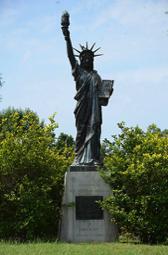
TAYLOR MEMORIAL STADIUM
The stadium was built in 1939-40 with funding support from the Works Progress Administration and a design by local architect Mitchell Seligman. One of Arkansas’ oldest ballparks, Taylor Field hosted minor league baseball teams, including the Pine Bluff Judges, Pine Bluff Cardinals and Pine Bluff Locomotives. More recently, the field has been home to a local high school baseball team and has hosted tournaments in the Babe Ruth League. Its grandstand has a capacity of about 1800, with another 600 in the bleachers. The field is 315 feet down the foul lines and 390 feet to center field. It was listed on National Register of Historic Places in 2010. It is located at 1201 Jim Hill Way in Pine Bluff.

TRINITY EPISCOPAL CHURCH
Trinity Episcopal Church (also known as St. John's Parish) is a historic church at 703 West 3rd Avenue (corner of Oak Street) in Pine Bluff. Its congregation meets in a handsome brick Gothic Revival structure, with a square buttressed tower and buttressed side walls with lancet-arched stained glass windows. The church was built 1866-70 for a church congregation organized in 1860 by the Rev. Robert Trimble. Initially named St. John's, it was renamed Trinity after Trimble received guidance from members of the Trinity Church in New York City. It is unique in Arkansas as having a burial chamber under its chancel; it is that of early parishioner Cornelia Bell Roane, who died in 1862. The building was listed on the National Register of Historic Places in 1974.
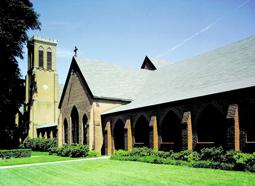
W.E. O’BRYANT BELL TOWER
This unique bell tower occupies a prominent central position on the campus of the University of Arkansas at Pine Bluff. It is a three-stage brick structure, with open arches at the base where a fountain once stood. The second stage houses a belfry, and the third, a clock. The corners are buttressed, and the levels divided by bands of concrete. The tower was built in 1943-47. The tower was listed on the National Register of Historic Places in 1998.
